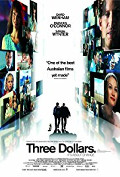
Directed by
Robert Connolly
119 minutes
Rated M
Reviewed by
Bernard Hemingway

Three Dollars
Synopsis: Eddie (David Wenham) is a chemical engineer with a solid public service job, a mortgage, a loving wife Tanya (Frances O'Connor) and daughter. His childhood sweetheart Amanda (Sarah Wynter) turns up unexpectedly just as Eddie enters a watershed period of his working life - a dilemma which forces him to choose between his conscience and the prospect of going down the drain financially.
It is difficult to see why Robert Connolly's film has received a goodly share of critical plaudits as it is so clearly wanting, particularly in the script department. Adapted by Connolly and Elliot Perlman from the latter's novella it follows the story of Eddie Harnovey, before and after he is sacked from his government job. Reminiscent of 2004's Tom White which had similar subject matter, if that film was not entirely convincing it was much more so and much more coherent than Connolly's film.
Whilst disappointing compared to his first film,The Bank, 2001, which also starred David Wenham, when taken with that film, Three Dollars indicates that Connolly is much more confident with genre fiction than the kind of realist drama he attempts here.
Basically nothing really works, the film coming across as a pastiche (and that's being generous, some would say a mess) of elements that in themselves have merit but that do not cohere in any convincing way. The simple equation of realism with hardship is contrived, with both the central character and his wife going from middle-class comfort to poverty in the bat of an eyelid. Thus, the former joins a band of derelicts and is rifling through dustbins within 24 hours of being sacked (from the public service, mind you!! Not easy to do!) and the latter is waiting for the meat section at the supermarket to slap clearance prices on their already cheapest cuts because her contract (as a tutor/lecturer?) has not been renewed. Such behaviour would seem to indicate characters bereft of a modicum of nous and makes no sense in two people who have evidently no ruinous habits and who have clearly got so far in life as to own a house, have jobs, a child etc etc.
There are the unnecessary flashbacks to their courting days, with O'Connor looking particularly unconvincing as a 20-something student, a rather loosely-related conceit about, Amanda, a childhood sweetheart, who Eddie is supposed to see every 9½ years, laboured illustrations of Eddie's Good Samaritan character, a story about shonky land deals that sits uneasily in the narrative middle ground (but that gives Connolly an amusing opportunity to quote from North By Northwest) and a sub-plot about a sick daughter that gets thrown in to compound Eddie's moral angst. And given the film's as-long-as-we've-got-each-other ending why would you play New Order's Love Will Tear Us Apart, Again over it?
David Wenham, as always, carries his weight convincingly but Frances O'Connor doesn't get to do much with her limited material other than be neurotic. And unlike Alkinos Tsilimidos' Tom White, despite the extensive exposure of Melbourne locations there is little sense of authenticity here, but rather more of stylistic derivation from American models. Thus, if Melbourne is not the provincial town it was twenty years ago it's hard to believe that someone could be beaten to pulp at Flinders St. Station and left for the 20-30 minutes the film requires to integrate a narrative strand with no-one offering help. Greed and economic rationalism may have corroded our Antipodean ways, but not that much.
A better developed script or a more ruthless approach to editing may have given us a stronger film but unfortunately as this stands, one can only commend the intention, not the outcome.
Want something different?





